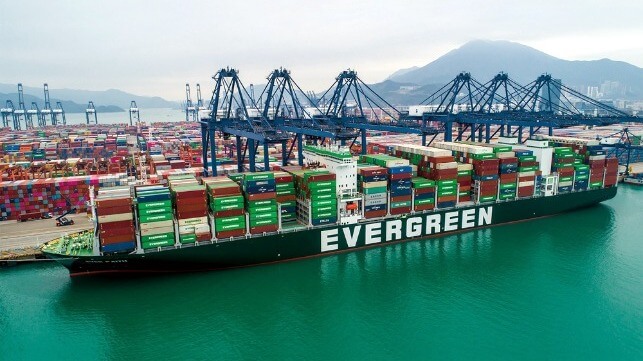Containership Schedule Reliability Builds Upward Trend in 2022

There continue to be signs that the surge in container shipping has peaked contributing to improvements in the operations of the carriers and reducing the backlogs at the major ports around the world. The latest monthly data from Sea-Intelligence shows that schedule reliability continued to improve for the third month in a row, and while still significantly below pre-pandemic levels is now exceeding the average for all of 2021, and only approximately 10 percent behind December 2020.
“This is now the second time since the start of the pandemic that schedule reliability improved year-over-year,” notes Alan Murphy CEO of Sea-Intelligence. “Global schedule reliability continues to trend upwards, increasing by 0.5 percent points month over month in July 2022.”
Based on its analysis of more than 60 carriers operating on 34 different trade lanes, the data analytics firm reports overall schedule reliability reached 40.5 percent in July, breaking the 40 percent market for the first time in 15 months. The overall industry was last at these levels in March 2021 and was at 44.5 percent in December 2020. For all of 2021, the industry averaged just under 36 percent schedule reliability, and with the recent improvements has reached the average level for 2022 after falling to a low of just over 30 percent in January 2022.
Major carriers from Maersk to Hapag-Lloyd have all discussed the declines in volumes experienced across the major trade routes. As these levels peaked in 2022, it has allowed the industry to recoup lost ground and ports to catch up on their backlogs. A clear demonstration of this is in Southern California where yesterday the Marine Exchange reported just 10 containerships were registered and crossing the Pacific to the ports of Los Angeles and Long Beach. There were 21 containerships at berth in the two ports and one more transiting to dock, down from the record of 109 containerships waiting for berth space at the two ports on January 9, 2022.
“The average delay for late vessel arrivals has been dropping sharply so far this year, tapering off a little in the past few months,” notes Murphy. “In July 2022, average delay improved by -0.09 days month over month, which means that the delay figure is now firmly below the 7-day mark, and an improvement over the respective 2021 figure.”
Sea-Intelligence also looked at how quickly the decline has been falling and specifically at the Southern California ports. Based on the current rate of recovery from the peak delays for Long Beach and Los Angeles, Sea-Intelligence is now forecasting that the average delay will revert to the pre-pandemic baseline in November 2022, several months earlier than had been previously forecast. Before the pandemic, the industry-wide average was just over four days.
Overall schedule reliability for the major carriers however on average remains below the industry as a whole. The top 14 carriers averaged just under 37 percent schedule reliability in July. Maersk remains at the top of the list with 48 percent overall schedule reliability, while CMA CGM and Evergreen were the other two carriers above the 40 percent industry average.

that matters most
Get the latest maritime news delivered to your inbox daily.
Asian-based carriers showed the strongest overall gains in July. Evergreen jumped more than 28 percentage points from the bottom of the list to second overall with 44 percent schedule reliability. While not as dramatic, Wan Hai, HMM, PIL, COSCO, and OOCL, all showed strong gains.
It remains to be seen if the industry can continue to consolidate the gains achieved so far in 2022. Historically, scheduled reliability tails off in the peak season starting in August and September. In addition, the backlog remains at the U.S. East Coast ports and grew recently especially in Germany as the North Sea ports experienced now settled labor disputes. Germany’s ports rose to year-long highs for their backlogs last week with Felixstowe’s longshore workers on strike. The labor troubles may continue at the UK ports and with overall volumes on decline carriers for the first time since early in the pandemic have begun to selectively blank sailings from their schedules.
